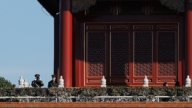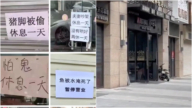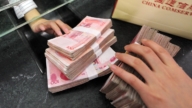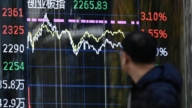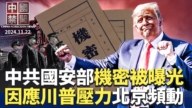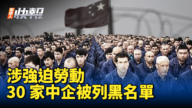【新唐人2013年12月30日訊】日前,大陸湖南曝光了一起特大賄選醜聞案,近600名人大代表涉及參與賄選,涉案金額超過一億元人民幣。涉案範圍之廣、人數之多、金額之大、性質之惡劣,引發了社會輿論強烈譴責。
據中共官方媒體報導,12月27號到28號,湖南省人大常務會宣佈,在衡陽市十四屆人大一次會議期間,以賄賂手段當選的56名省人大代表當選無效。同時,衡陽市人大常委會也召開會議決定,接受512名收受錢物的衡陽市人大代表辭職。此外,湖南省政協副主席童名謙因失職瀆職,對賄選案負有直接領導責任,被免職和接受調查。
官方通報說,在差額選舉湖南省人大代表過程中,發生了嚴重的以賄賂手段破壞選舉的違紀違法案件——56名當選的省人大代表存在送錢拉票行為,有518名衡陽市人大代表和68名大會工作人員收受錢物,涉案金額高達 1億1000多萬元人民幣。
據了解,這56名通過行賄當選的省人大代表,有20人來自人大、政府機關、行政機構及國家企事業單位,企業界則有32人涉及。
「中國國家行政學院」教授汪玉凱在接受媒體採訪時表示,衡陽市的人大賄選案不是個別現象,而是具有一定代表性,反映出腐敗已經滲透到各個角落去。
北京市律師協會憲法人權委員會委員楊學林:「我們查出來的,或者沒有查出來的這些賄選應該是比較多的,當然這肯定是一個弊端了。根本上剷除是不可能的,因為它有一個大的環境,各方面的土壤在那裏擺著。」
湖北前民選人大代表,民間選舉專家姚立法也指出,在選舉人大代表過程中,賄選現象極為普遍,湖南的賄選,只是冰山一角。
湖北前民選人大代表,民間選舉專家姚立法:「我也競選過省人大代表,我也選過省人大代表,這個內幕我是知道一二的,從控制提名啊到投票啊等等。還有賄選的問題,當然我沒有去賄選,但是我也被別人來向我賄選。賄選的問題,特別是近屆選舉產生的代表的賄選,實際上直接選舉也好,它這個賄選問題,在中國是一個普遍存在的問題。」
姚立法認為,賄選現象如此嚴重,中共當局不可能不知道,但這麼多年卻極少見到這類案件被查處。而這次湖南的賄選醜聞,如果不是因為有參選的人大代表公開舉報,產生了社會影響和輿論質疑,當局恐怕還會將選舉黑幕永遠遮蓋下去。
據《新京報》報導,今年年初,在湖南省邵陽市舉行的省人大代表選舉中,民營企業家黃玉彪落選,隨後他通過網路以自身為例,舉報選舉中的「賄選」現象,引發了社會強烈關注。
據黃玉彪講述,他在參選前,被當地領導暗示需要賄選,既氣憤又無奈,在送了32萬紅包給300多名有投票權的邵陽市人大代表後,他突然對賄選產生了厭倦,不再繼續賄賂,結果最終差20票落選。出於對賄選這一潛規則的不滿,黃玉彪在多家網站發帖實名舉報,揭發了邵陽賄選黑幕。在媒體和輿論壓力下,湖南省相關部門不得不展開調查,這才有了後面衡陽市賄選醜聞的曝光。
姚立法則曝出,人大代表與其說是選舉出來的,不如說是被內定或買來的更為確切。他說,當選的人大代表,真實身份是當地黑惡勢力分子的情況比比皆是。
姚立法:「現在實際上普遍存在的,是選票不值錢。老百姓就是說選舉是一個過程、是一個形式,選舉人是一個木偶,是為他人做嫁衣裳,是為他人背書,而不是個人意志的實現。你必須要按照他人意志去投票,而且你還不能吭聲。」
網民諷刺,難怪人大代表們時常在人代會上語出雷人,在「權錢交易」下的產物,怎能指望人大代表們反映人民的利益?
採訪/易如 編輯/張天宇 後製/李智遠
Nearly 600 Hunan Lawmakers Disqualified
Recently, serious election fraud in Hunan Province
was exposed involving nearly 600 candidates who were
accused of taking more than 100 million yuan
(US$16.5 million) in bribes during the election.
“The fraud, involving such a huge number of lawmakers
and a large amount of money is serious in nature, has a vile
impact, and has triggered strong public condemnation,”
a statement said.
Hunan Standing Committee of the National People’s
Congress (NPC) made an announcement on Dec. 27 and 28,
China’s state-owned media reported.
It said that during the meeting of Hengyang’s first session
of the 14th NPC, 56 candidates who won elections
via bribery were disqualified.
Meanwhile, Hengyang’s 512 NPC representatives
who accepted bribes were removed.
In addition, Tong Mingqian, Deputy Chairman of Hunan
Provincial Political Consultative Conference, who was
directly responsible for the election was dismissed
and placed under investigation for alleged breach of duty.
An official statement given during the election said
56 lawmakers elected to the provincial legislature offered
bribes to 518 Hengyang NPC representatives
and 68 other staff members.
The total amount of bribes offered amounted
to 110 million yuan (US$18 million).
Sources say that 20 out of 56 lawmakers
who were involved in fraud came from governmental organs
and state-owned enterprises.
32 came from the business world.
Wang Yukai, Professor at China National School
of Administration told media that the Hengyang fraud case
is not an isolated phenomenon.
It reflects that the corruption has penetrated
into every corner of China.
Yang Xuesen, member of Beijing lawyers society:
“There may be more such cases
that haven’t been checked out.
There is certainly a loophole.
It is impossible to prevent it from the root.
The environment facilitates its presence, it is a ripe
breeding grounds for the loophole.”
Yao Lifan, former Hubei NPC representative says
that during the election, it is a common practice
to offer bribes.
The Hunan case is just the tip of the iceberg.
Yao Lifa: “I have been participating in elections,
and have been elected.
From the control of the nominees to the vote,
I have behind-the-scenes insight.
Regarding bribery, I certainly didn’t offer bribes,
but other people have offered me bribes.
Regarding the fraud in the recent election,
it is common practice in China.”
Yao says it is impossible that the regime isn’t aware
of the serious election fraud.
Such cases have been investigated for many years.
If the media didn’t report on the Hunan fraud and the society
didn’t question it, the regime would continue to cover it up.
The Beijing News reported that in early 2013, private
entrepreneur Huang Yubiao lost in the Shaoyang City,
Hunan election.
Later, he posted about election fraud online taking himself
as an example.
It drew quite a bit of public attention.
Huang Yubiao says that before he participated in the election,
local leaders implied that he offer them money.
He was angry and felt hopeless.
After he sent 320,000 yuan ($53,000) to 300 Shaoyang NPC
representatives, he suddenly grew tired of bribery,
and no longer offered bribes.
In the end, he lost 20 votes and was defeated.
Huang wasn’t very happy with the rule of bribery,
thus he exposed Shaoyang’s election fraud online.
Under the pressure of media and public opinion,
Hunan regime has to carry out an investigation.
Later the fraud was exposed.
Yao Lifa revealed that the NPC representatives’ positions
were bought rather than won via the vote of the people.
He says that it is common practice that the elected
NPC representatives were local thugs.
Yao: “The current problem is not to actually use the ballot.
People say that the election is just a showcase, a formality.
The candidates are puppets serving for a specific group.
They cannot express their own opinion.
One must follow someone’s will to vote,
and one must keep silent.”
Netizens ridiculed the NPC representatives frequent
shocking speeches.
They wonder how people could expect the representatives
to speak out for them when they trade money for power.
Interview/YiRu Edit/Zhang Tianyu Post-Production/Li Zhiyuan


